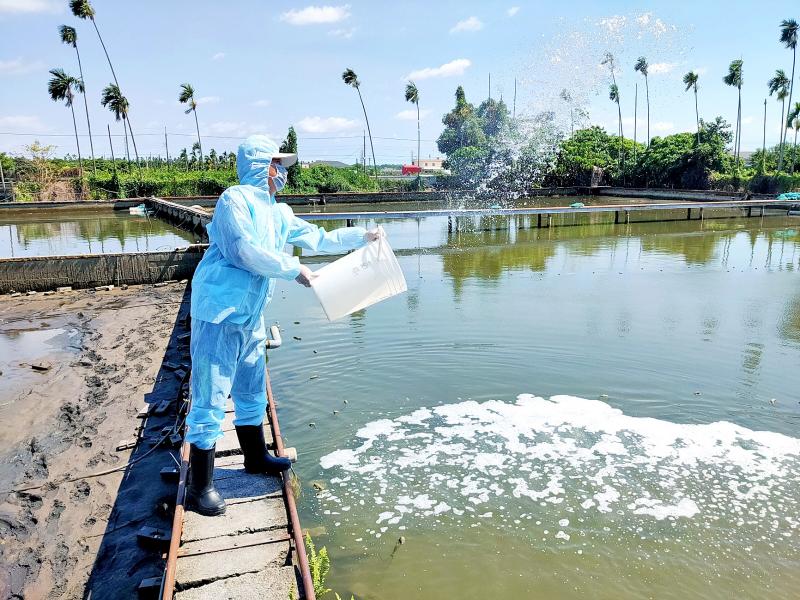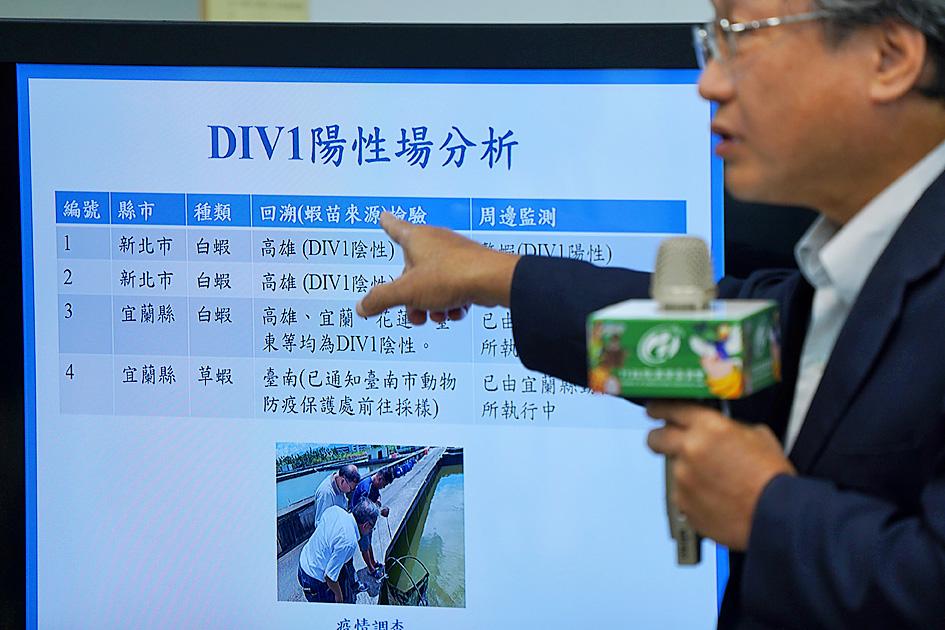Sixteen crayfish and shrimp farms across the nation were found to have been infected with the Decapod iridescent virus 1 (DIV1), which was first found in China in 2014, the Council of Agriculture (COA) said yesterday, adding that there is no risk of human transmission.
A COA inspection of crayfish and shrimp farms nationwide from May 8 to May 21 found that 12 crayfish farms, three king prawn farms and one giant tiger prawn farm tested positive for the virus, COA Deputy Minister Huang Chin-cheng (黃金城) told a news conference in Taipei.
All crayfish, shrimp and prawns testing positive for DIV1 are to be disposed of, Huang said.

Photo courtesy of Pingtung County Government
Of the 16 farms, two king prawn farms are in New Taipei City, while the other king prawn farm and one giant tiger prawn farm are in Yilan County, Huang said.
Seven of the crayfish farms are in Pingtung County, and the rest are in New Taipei City and Kaohsiung, as well as Hsinchu, Nantou and Yunlin counties, he added.
The council had notified customs to also test imported shrimp and prawns for DIV1, Huang said.

Photo: CNA
Most imported shrimp and prawns come from Vietnam, Thailand and Indonesia, he said, adding that while there have been reports of DIV1 infection in the three countries, the origin of the virus is unknown.
Taiwan is the second country to have confirmed cases of DIV1, he said.
The council has five more farms to collect samples from to meet its quota of 130 farms, he said.
It estimates that the crayfish, shrimp and prawn industry grosses more than NT$4 billion (US$134.9 million) per year.
The council will compensate farms for the crayfish, shrimp and prawns destroyed due to DIV1, while the Fisheries Institute and the Animal Health Research Institute will aid farmers in rehabilitating their ponds, Huang said.
Huang suggested that aquafarmers start the rehabilitation process by raising fish, or draining their ponds for six months to a year before raising crayfish, shrimp and prawns again.
The Bureau of Animal and Plant Health Inspection and Quarantine on Wednesday said that there is no cure for DIV1 and that the virus also contaminates the water in ponds.
There is no risk of animal-to-
human transmission of DIV1, which does not affect food safety, the bureau said, adding that none of the contaminated ponds shipped mature crayfish, shrimp or prawns to the market.
The bureau said it was not ruling out the possibility that the ponds were infected by migratory birds, or that the shrimp fries imported from abroad were contaminated before they were purchased, the bureau said, adding that the council is doing everything to contain the spread of DIV1.

A preclearance service to facilitate entry for people traveling to select airports in Japan would be available from Thursday next week to Feb. 25 at Taiwan Taoyuan International Airport, Taoyuan International Airport Corp (TIAC) said on Tuesday. The service was first made available to Taiwanese travelers throughout the winter vacation of 2024 and during the Lunar New Year holiday. In addition to flights to the Japanese cities of Hakodate, Asahikawa, Akita, Sendai, Niigata, Okayama, Takamatsu, Kumamoto and Kagoshima, the service would be available to travelers to Kobe and Oita. The service can be accessed by passengers of 15 flight routes operated by

Chinese spouse and influencer Guan Guan’s (關關) residency permit has been revoked for repeatedly posting pro-China videos that threaten national security, the National Immigration Agency confirmed today. Guan Guan has said many controversial statements in her videos posted to Douyin (抖音), including “the red flag will soon be painted all over Taiwan” and “Taiwan is an inseparable part of China,” and expressing hope for expedited reunification. The agency last year received multiple reports alleging that Guan Guan had advocated for armed reunification. After verifying the reports, the agency last month issued a notice requiring her to appear and explain her actions. Guan

GIVE AND TAKE: Blood demand continues to rise each year, while fewer young donors are available due to the nation’s falling birthrate, a doctor said Blood donors can redeem points earned from donations to obtain limited edition Formosan black bear travel mugs, the Kaohsiung Blood Center said yesterday, as it announced a goal of stocking 20,000 units of blood prior to the Lunar New Year. The last month of the lunar year is National Blood Donation Month, when local centers seek to stockpile blood for use during the Lunar New Year holiday. The blood demand in southern Taiwan — including Tainan and Kaohsiung, as well as Chiayi, Pingtung, Penghu and Taitung counties — is about 2,000 units per day, the center said. The donation campaign aims to boost

The Central Weather Administration (CWA) said a magnitude 4.9 earthquake that struck off the coast of eastern Taiwan yesterday was an independent event and part of a stress-adjustment process. The earthquake occurred at 4:47pm, with its epicenter at sea about 45.4km south of Yilan County Hall at a depth of 5.9km, the CWA said. The quake's intensity, which gauges the actual effects of a temblor, was highest in several townships in Yilan and neighboring Hualien County, where it measured 4 on Taiwan's seven-tier intensity scale, the CWA said. Lin Po-yu (林柏佑), a division chief at the CWA's Seismological Center, told a news conference